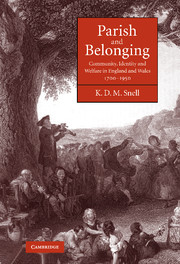Book contents
- Frontmatter
- Contents
- List of figures
- List of tables
- Preface and acknowledgements
- 1 Introduction – belonging and local attachment
- 2 The culture of local xenophobia
- 3 Settlement, parochial belonging and entitlement
- 4 Rural societies and their marriage patterns
- 5 ‘A cruel kindness’: parish out-door relief and the new poor law
- 6 Nailed to the church door? Parish overseers and the new poor law
- 7 Three centuries of new parishes
- 8 ‘Of this parish’: gravestones, belonging and local attachment
- 9 Conclusion – belonging, parish and community
- Select bibliography
- Subject and persons index
- Places index
5 - ‘A cruel kindness’: parish out-door relief and the new poor law
Published online by Cambridge University Press: 27 July 2009
- Frontmatter
- Contents
- List of figures
- List of tables
- Preface and acknowledgements
- 1 Introduction – belonging and local attachment
- 2 The culture of local xenophobia
- 3 Settlement, parochial belonging and entitlement
- 4 Rural societies and their marriage patterns
- 5 ‘A cruel kindness’: parish out-door relief and the new poor law
- 6 Nailed to the church door? Parish overseers and the new poor law
- 7 Three centuries of new parishes
- 8 ‘Of this parish’: gravestones, belonging and local attachment
- 9 Conclusion – belonging, parish and community
- Select bibliography
- Subject and persons index
- Places index
Summary
Of all the many controversies which have been fought upon Poor Law questions the most persistent and irreconcilable has been that upon the respective merits of ‘indoor’ and ‘outdoor’ relief.
It has always seemed to me a grievous error in the national economy to shut people within workhouse walls because they sought employment and could not get it … To me it has seemed cruel, terribly cruel, to take the aged and infirm from the cottages they have laboured to keep above their heads, and which they have sanctified with their affections, and shut them up in the workhouse, drilling them in their old days under the discipline of a barrack-yard … terribly cruel to break up ‘the old house at home’ of an old couple whose eyes see ‘home’ written in every corner of it.
For every one in-door pauper, there are, on the average, more than twelve out-door. Such is the result of the endeavour so severely made, by the administrators of the Poor Law Amendment Act, for some time after its passing in 1834, to make the workhouse the only place of relief for the poor!
INTRODUCTION
At first glance, the title of this chapter might be thought self-contradictory. We are so accustomed to associate the new poor law with the union workhouse, both in popular and academic discussions, that a consideration here of out-relief in people's own homes and parishes after 1834 might seem a misplaced emphasis.
- Type
- Chapter
- Information
- Parish and BelongingCommunity, Identity and Welfare in England and Wales, 1700–1950, pp. 207 - 338Publisher: Cambridge University PressPrint publication year: 2006



